Holiday Memories 2011
 Richard_Peck[1](Original Import)](https://s3.amazonaws.com/ArchiveImages/SLJ/2011/Richard_Peck[1].jpg) Richard Peck has written more than 20 novels and received SLJ's Margaret Edwards Award for his body of work in 1990. He became a National Book Award finalist in 1998 for A Long Way From Chicago (Dial, 1998) and won the Newbery Medal in 2001 for A Year Down Yonder (Dial, 2000). His latest book, Secrets at Sea (Dial, 2011), is an irresistible story involving a mouse family and their seafaring adventures. Peck's Amanda/Miranda (Viking, 1980), a historical novel set on the Titanic, will be reissued in January, in time to commemorate the 100th anniversary of the ship's fateful voyage.
Richard Peck has written more than 20 novels and received SLJ's Margaret Edwards Award for his body of work in 1990. He became a National Book Award finalist in 1998 for A Long Way From Chicago (Dial, 1998) and won the Newbery Medal in 2001 for A Year Down Yonder (Dial, 2000). His latest book, Secrets at Sea (Dial, 2011), is an irresistible story involving a mouse family and their seafaring adventures. Peck's Amanda/Miranda (Viking, 1980), a historical novel set on the Titanic, will be reissued in January, in time to commemorate the 100th anniversary of the ship's fateful voyage. The Christmas Kitchen
My dad's favorite holiday, hands down, was Halloween. Through long, chill Halloween nights he lay with weird patience under our spirea bushes, waiting to drop a lit cherry bomb directly behind a Halloween vandal with a bar of soap in hand, heading for our front windows.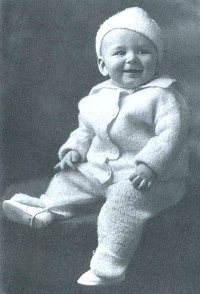
Peck's first Illinois winter
My first Halloween memories, therefore, have nothing to do with candy corn or trick-or-treating in a Pluto mask. They are of my dad bundled up in his hunting jacket, pockets crammed with fireworks and a box of matches in hand, tramping off the porch and down into the bushes. I worshipped the ground he walked on. For dad, the year went downhill from there, though he rallied for Christmas. My mother preferred holidays that cost nothing and gave my dad no scope for blowing up adolescents. But they met in the kitchen for Christmas. Mother was a trained dietician with stacks of her own tested recipes on 3" x 5" cards and an angel food cake that floated off the plate. My dad loved everything about food, from the bird falling out of the sky and the fish flopping in the bottom of the boat to the turtle parts jumping in the frying pan and the Parker House rolls sliding out of the oven, just as the company was pulling in the drive. Oh, the sound of car doors and the first glimpse of family faces in the frosted-over window of the back door. Guests always came in the back door because the kitchen was where Christmas was. In memory, company is always coming. Nuts figured prominently: the chestnuts in the dressing, the peanuts in the brittle. And so Christmas began in autumn, out country roads. There was very little of Robert Frost in my dad and nothing of New England. But...whose woods these were he thought he knew. They weren't ours, but he could always walk straight to a stand of hickory trees, however deep in somebody else's timber. We shook them down and picked them clean. And our hands were stained for weeks from the black walnuts drying on a tarp out on the driveway. Through the lengthening nights we sat around the oil-clothed kitchen table, cracking English walnut shells and picking out the meats. Nuts went into everything. Anybody with an allergy to them would have fallen dead at the kitchen door. Nuts went in the fudge and the brownies, the Florentines, the divinity, the heavenly hash, and a confection we called fondant. And loaf after loaf of nut bread. Nuts were ground almost to powder and dusted across the tops of iced cakes. Cheese balls got rolled in them. Not only were nuts free, they weren't rationed.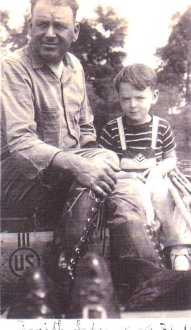
Peck, 4, with his father Wayne, 44, fishing in 1938
Because this is a memory of wartime Christmases. There's always a rumor in wartime that the boys will be home by Christmas. Yet the Christmases of my grade-school years came and went, and the war ground on and on. Another rumor went around Dennis Grade School that there'd be no Christmas next year, not a real one. After all, a lot of the seasonal staples: pineapple, chocolate, coconut, bananas had already vanished and wouldn't reappear until 1946, along with gas, rubber tires, cars, and shoes. Who knew what would be the next to go? At school, our teachers: Miss Welch, Miss Cole, Miss Marron had various ways of reminding us what over-fed little ingrates we were even to expect Christmas bounty in a world where children in Europe and Asia were starving and freezing. My dad said less about that, but swinging an arm that had been nearly blown off his shoulder in World War I, he went to work early in the year to make sure that at our house Christmas kept. Sugar was rationed, a challenge as crucial as Stalingrad for a kitchen that hung in a white fog of confectioner's sugar throughout the month of December. We started in summer, pooling our ration books, standing in lines. There went Dad, barreling down North Main Street in his fishing car, burning precious gas, in hot pursuit of a rumor that Kroger's had sugar. We gave up Kool Aid because you had to add sugar to it. Visions of sugar plums did actual dances in our heads. Every worth-its-weight-in-gold five-pound bag of Domino sugar we managed to score went straight up the ladder to an airtight drum in the attic. If this was hoarding, nobody used the word. Certainly nobody, come Christmas, who received a recycled coffee can full of fondant and candied orange peel, pfeffernusse, truffles, divinity English toffee and caramels wrapped in waxed paper—a Folger's can wrapped in pre-war paper with a somehow defiant holly sprig on top. The rest of the year was Praise the Lord and Pass the Ammunition. It was We Did It Before and We Can Do It Again. It was scrap drives and bond drives and paper drives and defense stamps. It was tighten your belt and suck it up. But for one bright corner of the dwindling, khaki-colored year we kept Christmas. It was dad rolling out the peanut brittle, one-handed, on the marble-topped table. It was something that smelled like heaven just sliding out of the oven, and company coming. It was Peace on Earth.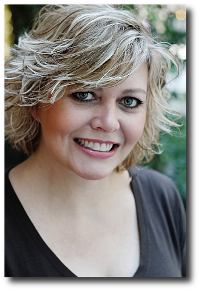 Lisa McMann, a best-selling New York Times author of the "Wake" (S&S) trilogy, welcomes the new year with her new novel, Dead to You (S&S, 2012), scheduled for release in early February. Her book Unwanteds (S&S, 2011) is a fantasy aimed for middle school readers, and Cryer's Cross (S&S, 2011) has just been released in paperback.
Lisa McMann, a best-selling New York Times author of the "Wake" (S&S) trilogy, welcomes the new year with her new novel, Dead to You (S&S, 2012), scheduled for release in early February. Her book Unwanteds (S&S, 2011) is a fantasy aimed for middle school readers, and Cryer's Cross (S&S, 2011) has just been released in paperback. The Terrible Truth About the Presents
Every December, my Aunt Rosie dropped off gifts for my two older brothers and me, and we'd put them under our tree until Christmas. She always gave us the same thing—one of those fancy, bumpy glass jars with a lid, half-filled with delicious candy—and it was the most awesome present ever. Caaaaaaandy! I remember lying on the floor under the tree next to the one with my name on it, inhaling the sugary goodness through the wrapping paper. I couldn't wait to rip it open. All was good in the world. But then, when I was eight and my baby sister was almost three, I learned the real, stark truth about Christmas. No, this isn't a baby Jesus story or a Santa story. It's the story of something far more sinister. It all started when my parents had to go "to the lumber yard" one December evening (We kids didn't actually know what that meant because they went there often and never came home with any lumber). They left my oldest brother in charge to babysit the rest of us. As soon as we got little sister into bed, my brothers made a beeline for the Christmas tree, and I watched in horror, and then in fascination, as they explained that you can easily open wrapping paper and then close it again without anybody ever knowing. They proceeded to tell me what every present was under the tree. And then they reached for Aunt Rosie's gift for our little sister—it was the first year she was old enough to get her own glass jar of candy. To my dismay as my brothers expertly opened the package, my little sister's jar was FULL! I'd suspected for almost three years that she was the new favorite and that I had been demoted to the dreaded middle child status, but finally I had the devastating proof. Aunt Rosie loved my sister more. She gave her more candy than she'd ever given me. LisaMcMannkid-3[1](Original Import)](https://s3.amazonaws.com/ArchiveImages/SLJ/2011/LisaMcMannkid-3[1].jpg)
McMann, with brothers Mike Gort (left) and Ken Gort
After my brothers had carefully removed the wrapping paper, they opened the lid. And then they each took a piece of candy out and started eating it. My jaw dropped. They were stealing candy from my little sister's present—I had never seen such horrific injustice against a helpless toddler in my entire life. And I wanted in. I took a piece. With a rush of sugar, adrenaline and excitement over being included in this sinister secret, I laughed the laugh of a shoplifter. Then we wrapped up our little sister's jar and put it back under the tree. Muahaha! I was absolutely giddy with my own evilness. And then my brothers reached for the next jar. My jar. It was right about this moment that it dawned on me. Aunt Rosie hadn't been giving me half-full jars of candy all these Christmases. My brothers had been stealing and eating my candy for years. And now they were doing it right in front of me. Fools! They lost a lot of candy over the next several years. Of course, so did I, but the fun was in the sneakiness of it all. There was an art, a finesse to hauling loot without looking suspicious. As for our poor little sister—she never had a chance. (photo: my two brothers and me at Aunt Rosie's house a year or two before my innocence was ripped from my very soul)AnneLowe.jpg) Jack Gantos has been entertaining kids with his "Rotten Ralph" series since 1976. His Joey Pigza Swallowed the Key (HarperCollins, 2000) was a National Book Award finalist and Joey Pigza Loses Control received a Newbery Honor in 2001. In 2003, a Printz honor was given to Hole in My Life (FSG, 2002). Gantos's latest book, Dead End in Norvelt (FSG, 2011), has made its way onto several year-end lists, including the Washington Post's Best Children's Book for 2011.
Jack Gantos has been entertaining kids with his "Rotten Ralph" series since 1976. His Joey Pigza Swallowed the Key (HarperCollins, 2000) was a National Book Award finalist and Joey Pigza Loses Control received a Newbery Honor in 2001. In 2003, a Printz honor was given to Hole in My Life (FSG, 2002). Gantos's latest book, Dead End in Norvelt (FSG, 2011), has made its way onto several year-end lists, including the Washington Post's Best Children's Book for 2011. Caribbean Christmas
As you can see by our Christmas day photograph, we did not appear to be decked out for the holiday. We had just moved down to Barbados from Western Pennsylvania and my mother had anticipated a traditional Christmas, and she went so far as to hire a photographer to record our family celebration so that she could send a photo back to her worried parents to assure them that the island was Christianized and that the children were not, as my grandmother feared, snatched away by cannibals and cooked up in a massive ossuary for their own pagan feast. Our lack of any Christmas ornamentation was due largely to the U. S. Navy, to which my father belonged. They were shipping down our housewares, which included boxes of Christmas decorations, but they had not yet arrived. We had some clothes, but little else. My father had promised my mother that we would have a fragrant pine tree to punctuate the holiday, but the Navy was late in delivering that, too. It was supposed to arrive on the aircraft carrier Intrepid (which is now permanently retired on the Hudson River side of Manhattan), but the Intrepid was distracted with other duties more important than ours. So on Christmas morning my sister, brother, and I woke with the typical Christmas frenzy. Naturally, we were up before our parents and ran down the hall to gather in the living room. But still there was no evidence of the promised tree in that room, which was furnished with only a few potted poinsettias. We children were momentarily stunned. It's not that we expected snow, and a fireplace, and Santa and his reindeers, because we knew better. But we did believe, as my mother had promised us at bedtime, that a tree surrounded by Santa's gifts would await us in the morning.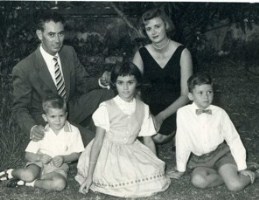
Jack and Elizabeth Gantos with their children (from left) Alex, Karen, and Jack, Jr., 7
My brother staggered into the next room and soon let out a gleeful shout and in that instant my mind rebounded from the disappointment of the living room to the certain promise that awaited us in the dining room. My sister and I bolted down the hall and joined him. There was no tree but there were packages—a huge stack of them all well wrapped in brown paper and arranged in a tall tree-shaped cone on the table. On the point of the stack of packages was a snow globe of Pittsburgh that my mother had bought at the airport as a last-minute souvenir. We danced around the packages with joy and made enough noise to wake my mother, who greeted us with a smile and herded us into the kitchen where she made coffee and hot chocolate and heated up pastries in the oven. My father joined us and before long we were sitting around the dining room table opening box after box of our new school uniforms—shorts and skirts and blazers with crests on the pockets and matching socks and regulation shoes—all the private British school trappings you could imagine. I even received a cricket bat, which completely puzzled me. My sister was given a tennis racket. My little brother pulled a large spongy rubber ball out of a box with ST. URSALINE'S NURSERY SCHOOL stenciled around the circumference. That ball looked like the strange new planet we were living on. And then the photographer arrived, and as you can see, we dressed properly and gathered onto the front yard without a hint of Christmas swag. The near-naked, twiggy pine tree arrived in port on the Intrepid sometime in February. My dad sheepishly carried it into the house. He was wearing his Navy whites and the dry brown needles rained down over his uniform like fallen ants. My mother took one look at it and glared at my father and he and the tree did an abrupt about face and we never saw it again. The next year we had an aluminum tree, but we didn't take any pictures though we did get great gifts.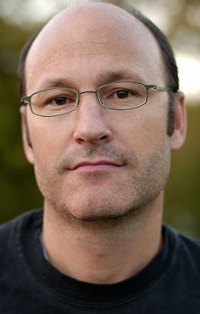 Loren Long has brought new artistic interpretations to the Christmas classic Drummer Boy (Philomel, 2008) and The Little Engine That Could (Philomel, 2005). He also had the honor of illustrating Of Thee I Sing: A Letter to My Daughters by President Obama (Knopf, 2010). His latest book in the "Otis the Tractor" series is Otis and the Tornado (Philomel, 2011) and his newest book for Simon & Schuster Book for Young Readers is Nightsong, scheduled for a September 2012 release.
Loren Long has brought new artistic interpretations to the Christmas classic Drummer Boy (Philomel, 2008) and The Little Engine That Could (Philomel, 2005). He also had the honor of illustrating Of Thee I Sing: A Letter to My Daughters by President Obama (Knopf, 2010). His latest book in the "Otis the Tractor" series is Otis and the Tornado (Philomel, 2011) and his newest book for Simon & Schuster Book for Young Readers is Nightsong, scheduled for a September 2012 release. Dad at Christmas
I'm the youngest of three boys. Lance, Linden (we call him Lindy), and Loren. My childhood was great. Christmas was magical. I could tell you of many wonderful Christmas memories and traditions, but today I'd like to share a story about my dad on one Christmas in particular. It's not a childhood memory, I was a bit older. Dad was a salesman for a building supply company. We were not affluent, my brothers and I did not get a lot of extras, but we were well taken care of. Born in the Great Depression era, dad was old-school frugal. It seemed no matter what I asked for in those days, dad had one answer, no. I must have asked dad for help buying a car dozens of times. The answer was "no." I bought my own car but it was lame. If money was involved, dad's answer was no. By my junior year in college, I had finally decided to try to become an artist for a living. At the end of the fall semester that year I picked up a flyer from the art department announcing something called the Kentucky Institute for European Studies. It was a program where students could go abroad for two months in the summer, study a certain discipline, and get college credits. I enthusiastically read how I could go to Florence, Italy, and study art history and take an independent drawing class for two months in the summer of 1986. I could roam the Italian streets and draw whatever caught my eye and experience famous art and architecture up close instead from a text book. The institute would take me on weekend excursions to Assisi, Rome, Siena, and Venice all the while getting college credits to help me earn a degree.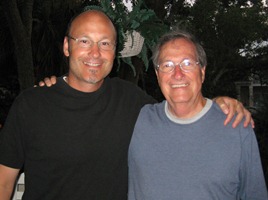
Long with his father, Bill, at Hilton Head, SC, the summer of 2008
I was convinced that this would greatly enhance my quest to somehow become a professional artist. There was only one problem. The cost of the program was several thousand dollars. Where would I get the money? I'd have to go ask dad and of course I knew what the answer would be. His answer would be no. All hope was gone. I didn't even bother to practice my pitch before approaching dad about the opportunity. I could hear him say it already "no". Still, I went through the motions, giving it the best attempt I could muster, including what it could mean to me and my future as some kind of artist. Dad sat quietly as he often did, typically waiting for me to bury myself with flimsy logic. As I finished my plea he quietly looked over the flyer. Silence. My ears were conditioned to hear what came next. So they could hardly comprehend when he looked up from the flyer and said, "I'll talk to your mother." I was shocked. My dad didn't say no. He was going to talk it over with mom. I had a chance! I didn't know anyone who had ever gone to Europe, and there was a chance I could go to Italy to study art as a 22-year-old kid for nearly an entire summer. Nothing was said about it for two weeks. I wondered if the Italy trip was ever going to come up again. Christmas was great. My brothers and I gathered with mom and dad and enjoyed a meaningful time together as we always did. Christmas morning, I had opened a sweater or two and some socks (the kind of things college kids get, no exciting bikes or G.I. Joes). And then dad handed me a box that felt like a shirt or something. I opened the box to find the Kentucky Institute for European Studies flyer. Dad said, "I think this would be good for you, son, we're going to make it happen. Merry Christmas."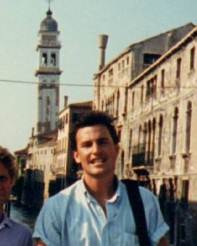
Long in Venice, Italy, during his junior year at college
Dad followed through and went to the parents meeting with me that February. He made sure I had all the clothes, art supplies, and essentials that I would need. He gave me an extra amount of spending money to take for the summer. And he and mom drove me to Atlanta from Lexington, KY, to meet the other kids for our flight abroad. It was the summer of my life. Dad was right, it was good for me. I believe it inspired my career as a young person who wanted to create art for a living. I can say it changed my course and set my path. Years later, when I was working as a freelance illustrator, mom and I were talking, and she happened to mention in passing that dad had finally made the last payment on that Italy trip. And she immediately put her hand over her mouth as if to say oops! When I pressed her for an explanation it came out that my father had taken a home equity loan from the bank so that he could send me to Italy that summer to study art and follow a dream. I never knew. He had been making little monthly payments all the while to pay it off. This Christmas will be my first Christmas without dad. Sadly, we lost him this past April. I'll miss him forever. And if you ask me if I'll ever forget that selfless sacrifice he made for me that Christmas in 1985, of course, like dad, I'll say no.RELATED
RECOMMENDED
CAREERS
The job outlook in 2030: Librarians will be in demand
CAREERS
The job outlook in 2030: Librarians will be in demand
ALREADY A SUBSCRIBER? LOG IN
We are currently offering this content for free. Sign up now to activate your personal profile, where you can save articles for future viewing






Add Comment :-
Be the first reader to comment.
Comment Policy:
Comment should not be empty !!!